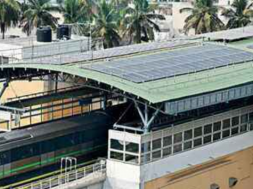
Chinese solar panel manufacturers have warned India that its march to 100 Gw of generation capacity will be derailed if India goes ahead with safeguards duty.
In the final public hearing for assessing the impact of imported solar cells and modules on the domestic manufacturing industry, the Indian solar manufacturing sector upped their ante by asking 95 per cent safeguards duty on imports. On the other side were the Indian project developers and more than a dozen importers from China, Taiwan and Canada who said any safeguards duty would be detrimental to India’s solar target.
Some of the domestic manufacturers such as Adani Green Energy & Vikram Solar in India operate in the Special Economic Zone (SEZ), the importers asked the Indian government to keep them out of the case.
“If Mundra Solar (Adani Green Energy) is included, the losses of the Indian industry are higher than when it is not included,” said a representative from Canada. If losses are high, it would lead to higher safeguards duty on the importers. Vikram Solar, which is another manufacturer in the SEZ asked for a ‘tariff rate quote’ for a specific amount of solar module manufacturing in the SEZ which should be levied with no duty.
SEZ manufacturing units are considered at par with foreign companies and hence, if imposed, safeguards duty would be imposed on them too.
Representatives from China, which is the largest solar panel importer to India, said safeguards duty is inconsistent with long-term goals of India for building solar capacity. “China said that over-protection is disadvantageous for India and that their imports fall under trade regulations and have not caused any injury,” said a source in the know.
Indian Solar Manufacturing Association (ISMA) in a public statement post the hearing said, it stressed on the fact that India is missing out on a multi-billion opportunity for the country by allowing import of inputs from countries such as China, Taiwan and Malaysia.
“Indian manufacturers are making solar power economical to ensure energy security for the nation. India is estimated to add capacity of 9,000 Mw solar power in 2018 and will give away market opportunity worth Rs 215 billion to China, Taiwan or Malaysia at the cost of interests and employment of national capital and labours.
In its application, ISMA has estimated that with a duty of 20 Cents/watt, the increase in power tariffs would be Rs 0.7 per unit. The project developers however have calculated the increase to be around Rs 1-1.5 per unit.
The current installed capacity of Indian solar cell manufacturing is around 1,386 Mw and module is close to 2500 Mw, as per government estimates. Less than 20 per cent of manufacturing capacity is operational due to low demand. Of the total solar power generating capacity, more than 80 per cent is built on imported cells from China, 10 per cent from the US and the balance domestic. India’s current solar power installed capacity is 21,000 Mw.
ISMA, last year in June filed an application with the government claiming imported solar cells have flooded the market, causing injury to the domestic industry. The association urged for a safeguards duty for a level playing field.
The hearing was chaired by Directorate General of Trade Remedies with representation from ISMA, Indian power project developers and their association, exporting countries – China, Taiwan, Europe, United States and their respective trade associations and government officials.














